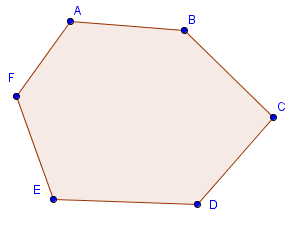Difference between revisions of "Convex polygon"
m |
m |
||
| Line 3: | Line 3: | ||
A '''convex polygon''' is a [[polygon]] whose [[interior]] forms a [[convex set]]. That is, if any 2 points on the [[perimeter]] of the polygon are connected by a [[line segment]], no point on that segment will be outside the polygon. For example, every [[regular polygon]] is convex. | A '''convex polygon''' is a [[polygon]] whose [[interior]] forms a [[convex set]]. That is, if any 2 points on the [[perimeter]] of the polygon are connected by a [[line segment]], no point on that segment will be outside the polygon. For example, every [[regular polygon]] is convex. | ||
| − | All [[ | + | All [[interior angle|interior angles]] of a convex polygon are less than <math>180^{\circ}</math>. Equivalently, all [[exterior angle|exterior angles]] are less than <math>180^{\circ}</math>. The sum of the exterior angles of any convex polygon is <math>360^\circ</math> and the sum of the internal angles of a convex <math>n</math>-gon is <math>(n - 2)180^\circ</math>. |
The [[convex hull]] of a [[finite]] set of points is a convex polygon with some or all of the points as its [[vertex | vertices]]. | The [[convex hull]] of a [[finite]] set of points is a convex polygon with some or all of the points as its [[vertex | vertices]]. | ||
Latest revision as of 21:10, 27 February 2020
A convex polygon is a polygon whose interior forms a convex set. That is, if any 2 points on the perimeter of the polygon are connected by a line segment, no point on that segment will be outside the polygon. For example, every regular polygon is convex.
All interior angles of a convex polygon are less than ![]() . Equivalently, all exterior angles are less than
. Equivalently, all exterior angles are less than ![]() . The sum of the exterior angles of any convex polygon is
. The sum of the exterior angles of any convex polygon is ![]() and the sum of the internal angles of a convex
and the sum of the internal angles of a convex ![]() -gon is
-gon is ![]() .
.
The convex hull of a finite set of points is a convex polygon with some or all of the points as its vertices.
See also
This article is a stub. Help us out by expanding it.










